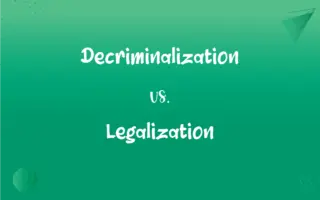Discount vs. Rebate: What's the Difference?
Edited by Janet White || By Harlon Moss || Updated on October 12, 2023
Discount refers to a direct reduction in price at the time of purchase. Rebate refers to a return of part of the purchase price after the purchase is made.

Key Differences
Discounts and rebates are both incentives aimed at stimulating purchases. A discount is typically an immediate reduction in the price a customer pays at the point of sale. On the other hand, a rebate involves a customer paying the full price upfront and then receiving a part of that amount back at a later date.
In retail, a discount might be applied for various reasons, including promoting a new product or clearing stock. In contrast, rebates are often utilized to indirectly lower the price of items without visibly altering the listed price, keeping a product’s perceived value.
From a consumer perspective, discounts are immediate and thus may be more psychologically appealing due to instant savings. Conversely, rebates require an action step from the buyer post-purchase, which might include submitting forms or receipts to claim the refund.
The administration of discounts and rebates differs significantly; discounts are calculated and applied at the point of sale, instantly benefitting the buyer. Rebates necessitate additional steps, requiring the customer and seller to engage in a post-purchase process to fulfil the rebate.
Interestingly, discounts and rebates can be utilized simultaneously. A buyer might receive a discount at the point of purchase and then also be eligible for a rebate, which is claimed after the transaction, offering layers of savings and incentives.
ADVERTISEMENT
Comparison Chart
Timing
Immediate
Post-purchase
Process
Applied at purchase
Requires claim
Impact on Price
Visible reduction
Invisible reduction
Psychological Appeal
High (instant savings)
Lower (delayed savings)
Administrative Complexity
Low
High
ADVERTISEMENT
Discount and Rebate Definitions
Discount
To lend money on after deducting the discount.
The bank will discount your check after evaluating its authenticity.
Rebate
A partial refund to someone who has paid too much money for tax, rent, or a utility.
After filing her taxes, she received a rebate from the government for overpayment.
Discount
To dismiss or minimize the importance of something.
The official chose to discount the rumors about the upcoming policy changes.
Rebate
To deduct or return an amount from a bill or charge.
The company will rebate a portion of the purchase price to incentivize buyers.
Discount
To regard (a possibility, fact, or person) as being unworthy of consideration because it lacks credibility.
The scientist decided to discount the theory as it lacked empirical evidence.
Rebate
To reduce the force or activity of something.
The soft materials inside the helmet help to rebate the impact of a fall.
Discount
A deduction from the usual cost of something.
The store offered a 20% discount on all clothing.
Rebate
To blunt or abate the intensity or force of something.
The high walls of the reservoir act to rebate the ferocious winds.
Discount
To underestimate the significance or effectiveness of something.
Do not discount her ability to win the race despite being an underdog.
Rebate
To diminish the edge or effects of a crisis or problem.
The government's economic policies helped to rebate the economic crisis's severity.
Discount
To sell or offer for sale at a reduced price
Discounting all merchandise.
Rebate
A deduction from an amount to be paid or a return of part of an amount given in payment.
FAQs
Is a discount immediately applied to a purchase?
Yes, a discount is applied immediately at the time of purchase.
Can a rebate be provided instantly at the point of sale?
Typically no, rebates are processed and provided after the sale.
What might be a reason for a store to offer discounts?
Possible reasons include sales promotion, stock clearance, or competitive pricing.
Is a discount rate negotiable?
In some contexts, like B2B sales, a discount may be negotiable.
Can discounts and rebates be used together?
Yes, they can be offered simultaneously for layered savings.
Which is generally simpler for customers, a discount or a rebate?
A discount is usually simpler due to instant application at purchase.
Do customers always prefer discounts over rebates?
Not always, but discounts often have a higher psychological appeal due to instant savings.
Are rebates used to maintain a product’s perceived value?
Yes, rebates can reduce the effective price without changing the listed price.
Can discounts affect a product’s perceived quality?
Sometimes, frequent or deep discounts might suggest lower quality to consumers.
How do companies benefit from offering rebates?
Rebates can stimulate sales without visibly reducing the product's listed price.
How does a mail-in rebate work?
A mail-in rebate requires sending purchase details (often a form and receipt) via postal mail to claim the rebate.
Is there a legal obligation to provide advertised discounts?
Yes, stores are generally legally bound to honor advertised discounts.
Do all customers generally redeem their rebates?
No, some customers may forget or choose not to redeem rebates, which is known as breakage.
Does a rebate provide instant savings?
No, a rebate is returned after the purchase often through a claim process.
Can a rebate be provided in forms other than cash?
Yes, rebates can sometimes be offered as gift cards or future purchase vouchers.
Are discounts typically offered for a limited time?
Yes, discounts are often provided during a specified promotional period.
How do customers claim a rebate?
Customers typically claim a rebate by submitting a form with a purchase receipt.
Is it common to offer a discount on new products?
It can be a strategy to drive trial and adoption of new products.
Are rebates only offered on physical goods?
No, rebates can also be offered on services, such as utility or subscription services.
Can a discount be offered on services?
Yes, discounts can be applied to both products and services.
About Author
Written by
Harlon MossHarlon is a seasoned quality moderator and accomplished content writer for Difference Wiki. An alumnus of the prestigious University of California, he earned his degree in Computer Science. Leveraging his academic background, Harlon brings a meticulous and informed perspective to his work, ensuring content accuracy and excellence.
Edited by
Janet WhiteJanet White has been an esteemed writer and blogger for Difference Wiki. Holding a Master's degree in Science and Medical Journalism from the prestigious Boston University, she has consistently demonstrated her expertise and passion for her field. When she's not immersed in her work, Janet relishes her time exercising, delving into a good book, and cherishing moments with friends and family.







































































